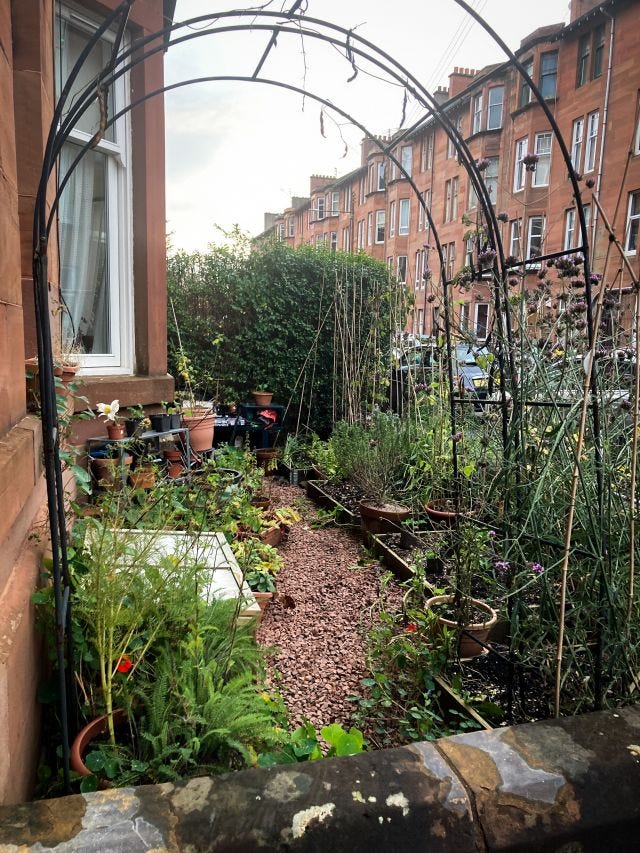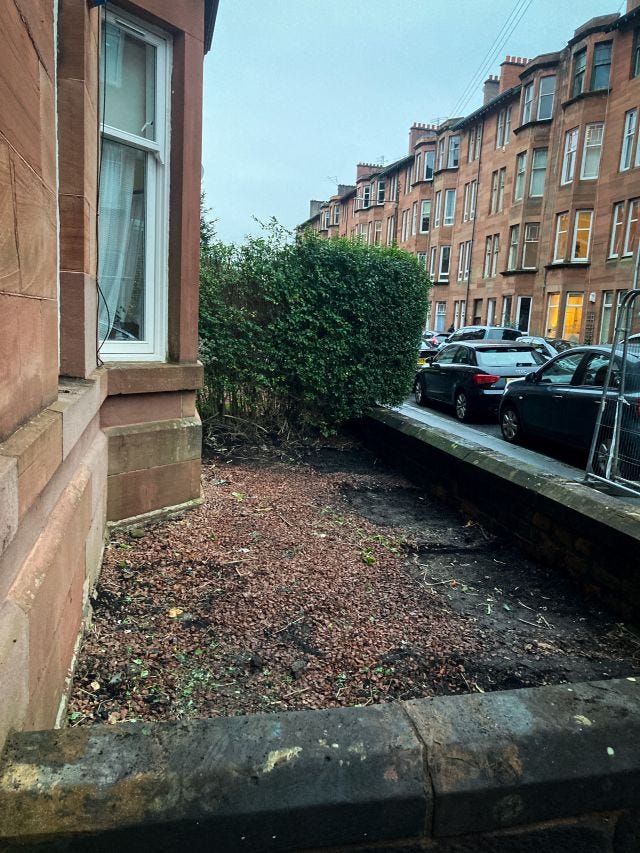The Garden is Gone

Last Thursday morning I spent 20 minutes in the garden, stroking leaves and taking pictures. There was an impressive mound of dark worm casts near the lettuce bed, and dozens of calendula seedlings sprung hopefully from soil crowded with eggshells. The nasturtium leaves were as large as my hand, and their flowers had gone from pure red to variegated oranges and yellows. The twirling arms of the jostaberry were aflame with yellow leaves. The verbena bonariensis continued to shed its minute purple flowers like confetti. I felt, as I always do, at peace. A small part of me shouted from far away that this was wrong, all wrong; I should be sad, uneasy, hunched over with grief. My kale plants were still in their pots, perched on top of the soil to mark where they would go in for the winter. But they would never go in. This was the garden’s last hour of being its crowded, temperamental, good-smelling best, and the task of absorbing its death felt as impossible as putting round pegs in square holes. Everything so insistently, undeniably alive.
The garden is gone. First we carried all the pots into the communal back garden, and then workmen sent by the landlord without our consent destroyed my trellises, and then generous neighbours helped me to disembowel the raised beds and carry the still-living compost to be stored out back in IKEA bags. On my hands and knees, I scraped the last good soil from the garden floor, gently putting worms in the bucket, and cried at how even in its death, the garden absorbed me in the tending of it. I yanked the nasturtiums out of the gravel and apologised to every one of them. As I cut the verbena bonariensis down, a single honeybee came out of nowhere and buzzed around my legs in confusion.
The fact that this didn’t need to happen is a topic for a different time. That anger is inaccessible to me right now, after having spent so much of this week using it to fight a losing battle. Too short a time ago, we were told that extensive work needs done to the building. When I asked if I might still have access to the garden during the works, we were told it wasn’t economical to erect a canopy and build the scaffolding so its legs sat outside the garden walls. When we argued for a rent reduction while works are ongoing, citing my reliance on the garden for chronic illness, we were told that the garden was never part of the rental agreement, that we don’t pay for it, that we’ve been allowed in it at the landlord’s whim and that if we dare ask for money, then he might as well ask us for even more money. I had told him that the garden was like an extension of my body; he told us that if we didn’t do as we were told, we wouldn’t get it back.
Disbelief, resignation, and sudden breathless devastation swung around and over and across my body like a rope with every new injustice. I cannot untangle the full sequence of events as we moved through them. On the first day I sobbed and hyperventilated, gasping in the realisation of what I would have to destroy. On the second day I thought maybe it could be ok; maybe there could be creative solutions. Every day after that is a blur of sleep deprivation, treachery, and darkest sadness. Some part of me has objected to describing it as the death of the garden; I resist anthropomorphising this ecosystem as if it was an individual. But it did die, the way rivers die and coral reefs die and fields die and forests die. Someone else didn’t think it was worth saving, so the precious and particular context within which I lived with all the slugs, worms, centipedes, mycelia, nematodes, snails, spiders, seedlings, herbs, berries, brassicas, and trees was irreparably displaced, destroyed, dislocated.
This week I lay sleepless through the nights, and felt like I couldn’t find solid ground, couldn’t orient where my body or brain was in relation to the land. The garden is gone; so where I am I? The garden is in the back communal garden now, the raised beds stacked on top of one another, the pots standing in uncomfortable groupings, unsure where to be; but this is no longer my garden. The garden is in parts, undone, unravelled, unmoored. The garden was the shape of the mint between the lettuce and sorrel, was the scent of compost and stone, was the borage seeds sleeping in soil and the calendula seeds from this year’s plants already rooting their tiny bodies eagerly into the homemade compost I had only just spread. The garden held so much of my memory; where will I keep it now?
The garden and I are in a kind of exile, still dead and still alive. And yet, despite the dizziness of being so adrift, I do not feel alone. With urgency and frankness, I put my plight on Instagram and was met with such an avalanche of care, I cry every time I remember it. I received dozens and dozens of messages, offering shock and sadness, seeds for next spring, manure for when we rebuild, and peoples’ own hands and labour to help me dismantle my beloved little kailyard before the Monday deadline. The generosity that has met me in this moment feels like I have suddenly been given precious access to a million other gardens: an assurance that there is really no such thing as scarcity when gardeners are involved; that I need not worry about scarcity being a product of this particular catastrophe; that we all share the same ground. The strange thing about having the garden taken from me is that I now feel so much more aware of how the garden and I were (are?) part of an infinite network of other gardens and their gardeners; how this longing to be close to the ground is a thread within me that threads through others too; that the garden was a beautiful fruiting body of this thread, which was specific to me but not unique within the thread as a whole.
I can’t bear to eulogise the garden. I can’t bear to remember what I’ve lost. I feel like I have felt after the funerals of loved ones; the repetitive shock of remembering I have to revise the future now, that my beloved as I knew them is no longer there for me. I had made such plans for the new year. Last night I had to unravel the hope that was still a glowing thing within me, a light I had forgotten to unscrew in all the madness. I was going to grow cucumbers against the wall and up the arch trellis this year. I was going to sow more poppy seeds amongst the verbena. I was going to grow zucchini where the kale had been, so they could get more sun, and grow the kale where the zucchini had been, so they could bask in the gentle shade of the verbena.
I don’t know what shape the garden will take in spring, when the scaffolding comes down in April. I think it will be the last year that there’s a garden here; we are hopeful and determined to have a garden somewhere else by this time next autumn. There won’t be the raised beds again, and certainly not the handmade fence of bamboo that sometimes let me imagine I was sitting in a medieval potager. There might be more pots to compensate. There might be more nasturtium and borage sown amongst the gravel, as a kind of resistance. But it won’t be the garden I knew, the garden that held so much of me and made me as insistently as I made it.
My friend, the writer Rebecca Nakaba, wrote to me last week, “Who came first, me or the garden? Who is more foundational to the other, who births whom, what/who grows into what/whom? I honestly can’t figure it out. The Garden, Me, The Garden, Me, The Garden…around and around I go. I have found the tiniest bit of solace in not being able to answer this question. We are a chicken and an egg and we are constantly becoming reincarnated lovers catching and missing each other through the shortest, most peaceful, most dire of eras. If you are scared of who you will be without the garden, you will be Meg Waiting for the Garden. And when you have it, you will be Meg with the Garden. The flip of it is, when the scaffolding comes, your garden will be Garden Waiting for Meg. And when the scaffolding goes, it will be Garden with Meg. And you’ll get to know your new selves all over again. The Garden, You, The Garden, You.”
*All my thanks to every single person who reached out to me this week, offering comfort, validation, and hope. But thanks especially to my wonderful neighbours: Lizzie, for bringing us pastries from Big Bear Bakery and helping me to finish clearing the garden and hauling compost; to Lindsey, for her muscle power in helping my clear beds and for the wonderful surprise care package; and to Allan, for never allowing me to lift the wheelbarrow and offering to send a strongly worded email on our behalf. So much love and gratitude to Kat Goldin for the offer of manure; to Sara Venn for the offer of her own home-saved calendula seeds; to Eilidh Weir for her generously panicked thoughts about possible solutions that mirrored my own panicked thoughts; to Carmen Sheridan for the surprise parcel with copies of the gorgeous Florxl zine and seed paper for future joy; to Elisabeth Plumlee-Watson for the most beautiful words of comfort and for including that deeply resonant poem extract by WS Merwin in this month’s Season’s Readings; to Rowan Lear of The Glasgow Seed Library for her suggestions about how I can take this issue forward politically; to my lovely and utterly generous mother-in-law for babysitting our anxious dog and ultimately taking him back to Largs with her so we could finish the job without distraction; to all the neighbours and Instagram pals who offered to physically help me clear the garden; to my dear collaborator Rebecca Nakaba, for the constancy of her friendship and her innate understanding of how all this feels; to every friend who listened to me rant in devastation about all this, especially Eissa and my mum; and all the thanks in the world to my partner Scott, for, quite literally, everything.




